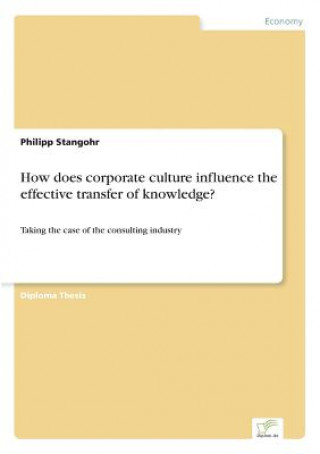
Kód: 05297990
How does corporate culture influence the effective transfer of knowledge?
Autor Philipp Stangohr
Diploma Thesis from the year 2000 in the subject Business economics - Business Management, Corporate Governance, ESCP Europe Business School - Campus Berlin (Unbekannt), language: English, abstract: Inhaltsangabe:Abstract:§The mai ... celý popis
- Jazyk:
 Angličtina
Angličtina - Väzba: Brožovaná
- Počet strán: 208
Nakladateľ: Diplom.de, 2000
- Viac informácií o knihe

Mohlo by sa vám tiež páčiť
-

Invisible Giants
52.01 € -

Second Language Speech Perception and Production
159.54 € -

Seminaire de Probabilites XXVI
70.86 € -

Confidentiality in the Model Law and the European Mediation Directive
65.43 € -

Principles and Perspectives in Cosmochemistry
363.44 € -

Bassoon Fundamentals
23.65 € -4 % -

Working Wagons
19.96 €
Darujte túto knihu ešte dnes
- Objednajte knihu a vyberte Zaslať ako darček.
- Obratom obdržíte darovací poukaz na knihu, ktorý môžete ihneď odovzdať obdarovanému.
- Knihu zašleme na adresu obdarovaného, o nič sa nestaráte.
Viac informácií o knihe How does corporate culture influence the effective transfer of knowledge?
Nákupom získate 433 bodov
 Anotácia knihy
Anotácia knihy
Diploma Thesis from the year 2000 in the subject Business economics - Business Management, Corporate Governance, ESCP Europe Business School - Campus Berlin (Unbekannt), language: English, abstract: Inhaltsangabe:Abstract:§The main question investigated in this European Research Project is whether corporate culture presents the biggest obstacle to knowledge management. To better answer this question two sub-questions are formulated: How does corporate culture influence the transfer of knowledge? and What are the key elements in a corporate culture that facilitate the process of knowledge transfer?§In order to answer these questions this study contains three parts: the literature review, the field research, and analysis and discussion.§The literature review explains the concepts of knowledge management and culture, discussing the relevant theories to each of the two. In the second part the methodology as well as the research site are stated and justified. Subsequently the results of the four case studies conducted are presented. The third part of this study analyses and interprets the findings with reference to the literature in order to answer the research questions. The limitations of the study will be discussed and recommendations for further research are offered. Last but not least, implications for the professional practice are pointed out.§Corporate culture clearly influences the transfer of knowledge. This influence is exerted by some key elements as proposed by T. Davenport and L. Prusak (1998), such as trust between the knowledge provider and the knowledge receiver, shared language, (un)structured time and meeting places, the willingness to share, the willingness to apply 'foreign' knowledge, and the willingness to judge knowledge objectively. This research confirms that these elements are indeed vital and no additional elements could be identified.§However, some components seem to be more influential than others. It is likely that their relative importance varies according to the industry investigated. Elements which do not pose any problems in the consulting industry, such as the willingness to apply 'foreign' knowledge and the objective judgement of knowledge, could probably present significant problems in other industries. It is advisable to look at these elements independently from the research site.§According to these elements, the consulting industry is generally judged to be conducive to the transfer of knowledge, the obstacles faced in this industry appear to be of a more operational nature. This appears to be an evolutionary process. In the beginning corporate culture presents the main obstacle to knowledge management. With time, other challenges emerge which are more and more operational.§Furthermore, corporate culture is not the only component that influences the transfer of knowledge. Instead its influence is shared with other main components. Some that could be identified are strategy, technological infrastructure, and processes. The relationship among these is very strong. All of them must be dealt with, one alone will not be sufficient.§Among these corporate culture is probably the most complex and needs constant attention. However, the conclusions drawn from the field research indicate that corporate culture in the consulting industry is, in principle, very favourable to knowledge management and does not represent the biggest obstacle to knowledge management. The biggest obstacle to knowledge management in the consulting industry is the harmonisation of all the necessary elements (corporate culture, technology, processes, and strategy). The latter is an obstacle which is operational but not fundamentally connected to corporate culture.§Inhaltsverzeichnis:Table of Contents:§Introduction1§1.literature review6§1.1knowledge management6§1.1.1Introduction6§1.1.2Data7§1.1.3Information8§1...
 Parametre knihy
Parametre knihy
Zaradenie knihy Knihy po anglicky Economics, finance, business & management Business & management Management & management techniques
175.41 €
- Celý názov: How does corporate culture influence the effective transfer of knowledge?
- Podnázov: Taking the case of the consulting industry
- Autor: Philipp Stangohr
- Jazyk:
 Angličtina
Angličtina - Väzba: Brožovaná
- Počet strán: 208
- EAN: 9783838623573
- ISBN: 3838623576
- ID: 05297990
- Nakladateľ: Diplom.de
- Hmotnosť: 277 g
- Rozmery: 210 × 148 × 12 mm
- Dátum vydania: 16. May 2000
Obľúbené z iného súdka
-

High Output Management
16.68 € -14 % -

Principles
26.10 € -23 % -
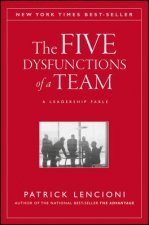
The Five Dysfunctions of a Team
22.62 € -20 % -

The Making of a Manager
16.48 € -24 % -

Turn The Ship Around!
12.07 € -16 % -

Hooked
12.89 € -24 % -

Inspired - How to Create Tech Products Customers Love, 2nd Edition
30 € -4 % -

Give and Take
10.23 € -24 % -

Multipliers, Revised and Updated
11.87 € -23 % -

Devil Take the Hindmost
16.58 € -22 % -

Traction
17.71 € -17 % -

The 4-Hour Workweek
23.03 € -18 % -

The Daily Stoic
14.12 € -24 % -
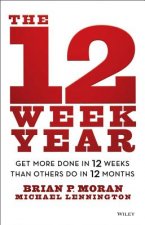
12 Week Year - Get More Done in 12 Weeks than Others Do in 12 Months
20.88 € -21 % -
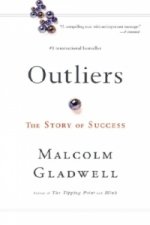
Outliers
10.03 € -9 % -

Way, the Enemy, and the Key
41.57 € -25 % -

Leadership BS
31.84 € -6 % -

Managing Change in Organizations
34.60 € -4 % -

Triggers
11.25 € -13 % -

Scrum
11.36 € -24 % -
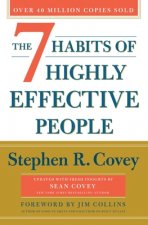
7 Habits of Highly Effective People
22.11 € -

Drive
12.28 € -23 % -

New One Minute Manager
10.64 € -21 % -

Wooden on Leadership
26.31 € -23 % -

Spiral Dynamics - Mastering Values, Leadership and Change
33.78 € -15 % -

Leaders Eat Last
16.07 € -

The 7 Habits of Highly Effective People
24.16 € -23 % -

How Women Rise
10.95 € -24 % -

Dealing with Difficult People (HBR Emotional Intelligence Series)
14.33 € -10 % -

Essentialism
13.41 € -21 % -

Million Dollar Habits
19.65 € -19 % -

Unlimited Memory
17.19 € -19 % -

Standard for Portfolio Management
72.29 € -4 % -

Primal Leadership
24.26 € -17 % -

Managing Transitions
18.63 € -23 % -

I Dare You!
4.70 € -23 % -

Executive Coaching with Backbone and Heart - A Systems Approach to Engaging Leaders with Their Challenges 2e
68.91 € -

27 Challenges Managers Face
27.64 € -6 % -

Economist Guide to Financial Management 3rd Edition
26 € -

It's Not the How or the What but the Who
22.72 € -27 % -

Millionaire Fastlane
26.51 € -

Extreme Ownership
24.16 € -23 % -

Leaders Eat Last
11.05 € -23 % -

The Coaching Habit
17.50 € -5 % -

Professional Product Owner, The
32.97 € -4 % -

It's the Manager
38.90 € -5 % -

Goal
21.19 € -19 % -

Co-Active Coaching
36.86 € -3 % -

The 10X Rule
22.62 € -20 %
Osobný odber Bratislava a 2642 dalších
Copyright ©2008-24 najlacnejsie-knihy.sk Všetky práva vyhradenéSúkromieCookies



 21 miliónov titulov
21 miliónov titulov Vrátenie do mesiaca
Vrátenie do mesiaca 02/210 210 99 (8-15.30h)
02/210 210 99 (8-15.30h)